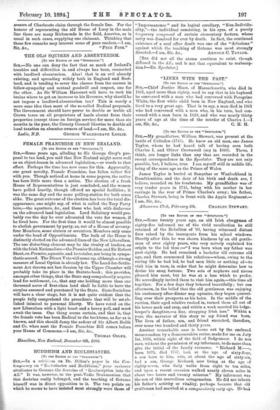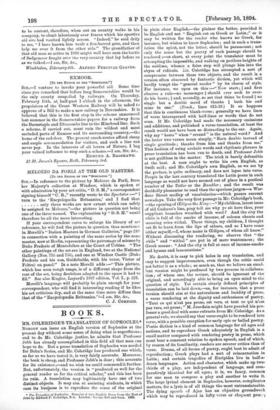[TO THZ EDITOR OF THE " SPZOTATOZ."]
SIR,—Some twenty years ago, an old Irish clergyman of eighty-five informed me of the vivid recollection he still retained of the Rebellion of '98, having witnessed distant
fires raised by the insurgents from his school windows. Shortly after this, he was shown kindness by an old gentle- man of over eighty years, who very naively explained his origin to the lad thus :—" I was born when my father was past eighty. He had remained a bachelor till extreme old age, and then summoned his relatives—whom, owing to the roving life he had led, he bad seen little or nothing of—to visit him in turn, in order that he might determine how to devise his snug fortune. Two sets of nephews and nieces pleased him most, but he was at a loss which to prefer. He accordingly invited them to visit him again,—this time all together. For a few days they behaved beautifully ; but one afternoon, in the belief that the old gentleman was enjoying his customary after-dinner nap upstairs, they began quarrel- ling over their prospects as his heirs. In the middle of the ruction, their aged relative rushed in, turned them all out of his house neck and crop, and within a week married his lodge.
keeper's daughter,—a fine, strapping Irish lass." Within a. year, the narrator of this story to my friend was born. The lives of father, son, and friend stretched, therefore, over some two hundred and thirty years.
Another remarkable case is borne out by the enclosed memorandum by a Somersetshire rector, made for me on July 1st, 1886, within sight of the field of Sedgemoor. I do not care, without the permission of my informant, to do more than give the initial of the family surname. "Richard
born 1675, died 1747, bad, at the age of sixty-four, a son born to him, who, at about the age of sixty-six,
had a son, George Richard, now living at the age of eighty-seven, who daily walks from eight to ten miles, and upon a recent occasion walked nearly eleven miles in about two hours and twenty minutes." My informant was the son of this marvellous octogenarian. He did not inherit his father's activity or vitality, perhaps because that old gentleman had married at a comparatively early age, 11e had to be content, therefore, when out on country walks in his company, to climb laboriously over fences which his sportive old sire had vaulted lightly across. "Indeed," he said drily to me, "I have known him vault a five-barred gate, and then help me over it from the other side." The grandfather of that old man so active in 1886 might well have seen the battle of Sedgemoor fought over the very country that lay before us as we talked.—I am, Sir, &c., Wimbledon, February 6th. ALFRED PERCIVAL GRAVES.







































 Previous page
Previous page